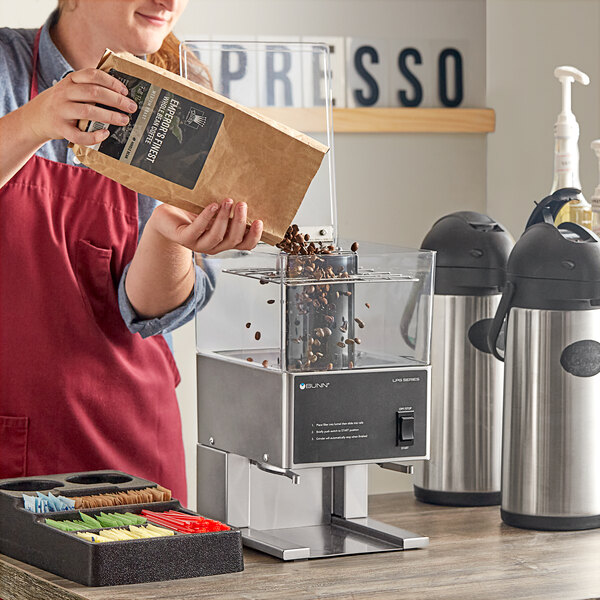Industrial Coffee Grinder vs. Personal Grinder: Key Differences Outlined
Industrial Coffee Grinder vs. Personal Grinder: Key Differences Outlined
Blog Article
Industrial Coffee Mill Guide: Boost Effectiveness and High Quality
In the competitive landscape of coffee manufacturing, selecting the appropriate commercial coffee mill plays a pivotal role in enhancing both efficiency and product quality. Comprehending the nuances of different grinder kinds and vital attributes-- such as customizable work settings and robust building and construction-- can significantly influence the last taste profile of the coffee. In addition, the optimization of the grinding procedure, paired with attentive maintenance, is crucial for maintaining efficiency in time. As we discover these crucial aspects, it becomes evident that the ramifications expand past mere equipment option, affecting total service success in means that warrant closer assessment.
Comprehending Mill Kinds
When picking an industrial coffee grinder, comprehending the various kinds readily available is vital for optimizing both taste extraction and operational effectiveness. The two key kinds of grinders are blade mills and burr grinders.

Ultimately, selecting the appropriate kind of mill is integral to maintaining top quality and performance in coffee manufacturing, making it imperative for businesses to buy high-quality burr grinders for optimum results.
Secret Attributes to Think About
Selecting a commercial coffee mill needs mindful factor to consider of several vital features that can considerably affect both performance and the total coffee experience. Among the primary elements to review is the grinding system. Burr grinders are generally favored over blade mills, as they supply a consistent grind dimension, which is important for optimum removal and taste.
One more crucial feature is the grinder's capacity. A functional mill with several setups enables you to customize the work size to various developing methods, improving the coffee's flavor account.
Review the grinder's sound level, particularly in a hectic café or manufacturing setting, where extreme sound can be turbulent. Spending in a grinder that stabilizes these functions can considerably boost both functional performance and the top quality of the coffee offered.
Optimizing Grinding Process
To achieve the ideal outcomes in coffee prep work, enhancing the grinding procedure is important. learn the facts here now The work size significantly affects extraction, flavor, and general top quality of the made coffee.


Additionally, monitoring the grinding rate can maximize the process. Slower grinding usually produces much less warmth, protecting fragile flavors and aromas. Alternatively, much faster grinding might generate extreme warmth, negatively impacting the coffee's high quality.
Upkeep and Treatment Tips
Correct maintenance and treatment of commercial coffee mills are necessary for ensuring optimum efficiency and durability. Regular cleaning is the structure of maintenance; deposit build-up can affect flavor and grinding efficiency. It is suggested to clean up the grinder after each usage, wiping down the outside and getting rid of any kind of coffee grounds from the burrs.
Furthermore, evaluate the grinding burrs for deterioration. Plain burrs can compromise work uniformity, so they must be changed as essential. Industrial Coffee Grinder. Regularly calibrating the mill is likewise important, as this keeps the wanted work dimension for numerous developing methods
Lubrication of moving parts should be carried out according to the manufacturer's requirements, as this lowers friction and lengthens the life of the devices. It is important to use food-grade lubricants to make certain safety and compliance with health laws.
Finally, maintain the grinder in a completely dry and steady environment to stop rust and corrosion. By adhering to these maintenance and care pointers, operators can enhance the efficiency of their industrial coffee mills while guaranteeing high-grade outcome and expanded functional life.
Roi Analysis
Assessing the return on financial investment (ROI) for commercial coffee mills is vital for services looking for to enhance their coffee manufacturing capacities. A thorough ROI analysis helps establish the economic stability of purchasing high-grade grinders, enabling organizations to evaluate the preliminary expenses against prospective gains.
To carry out a thorough ROI evaluation, services need to consider a number of crucial aspects. Analyze the acquisition price of the grinder, consisting of setup and any type of essential modifications to existing infrastructure. Next off, calculate operational expenses, consisting of power usage, upkeep expenditures, and labor efficiency improvements. High-performance mills usually result in reduced grinding time and enhanced throughput, which can considerably enhance productivity.
In addition, consider the effect on item high quality. Industrial Coffee Grinder. Superior mills generate an even more regular work dimension, which can improve flavor accounts and client fulfillment, inevitably driving sales. By boosting the high quality of the last item, organizations can warrant greater pricing, leading to enhanced profits
Final Thought
In summary, a commercial coffee grinder continue reading this plays a critical function in improving both effectiveness and product high quality within coffee manufacturing. Eventually, the calculated investment in a trusted grinder contributes substantially to boosted income and competitiveness in the coffee industry.
In the competitive landscape of coffee production, picking the appropriate commercial coffee grinder plays a critical duty in enhancing both efficiency and item high quality. The two main kinds of grinders are blade grinders and burr mills. Within the burr grinder classification, there are flat burr mills and cone-shaped burr grinders, each with its advantages. Burr grinders are normally chosen over blade grinders, as they provide a regular work size, which is vital for optimum removal and taste.
In recap, an industrial coffee mill plays an essential duty in boosting both look at this site effectiveness and product high quality within coffee manufacturing.
Report this page